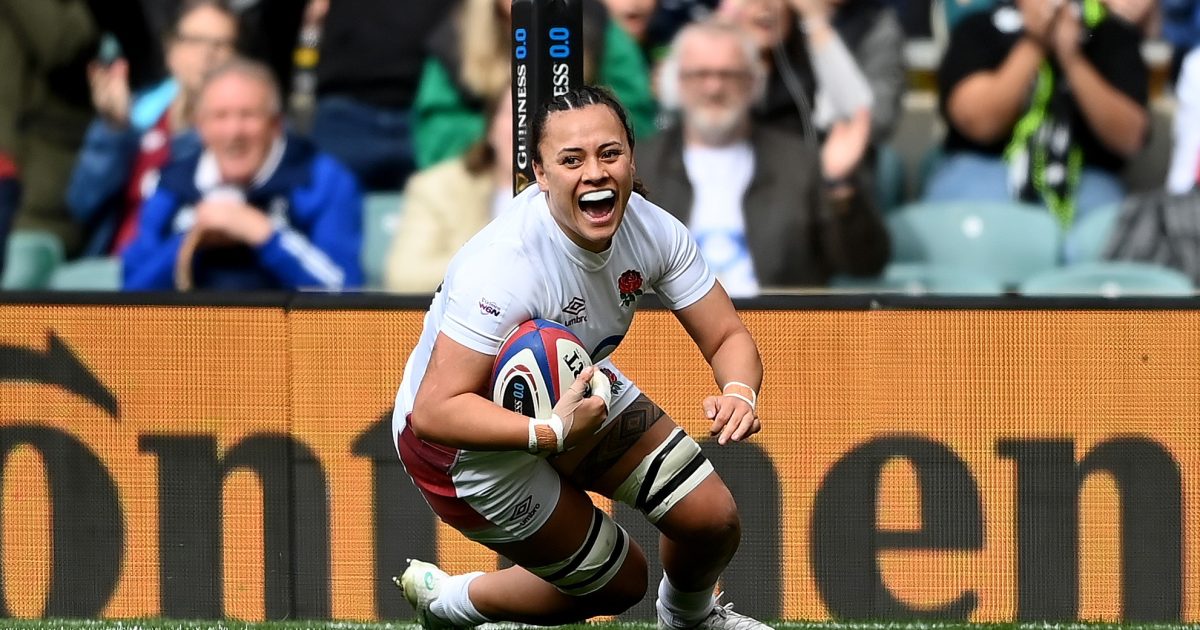John Mitchell hands Exeter flanker first England start as stalwart returns

Maddie Feaunati will make her full England debut against France on Saturday as Helena Rowland returns to the Red Roses line-up for the first time since the opening match of the Guinness Women’s Six Nations.
Feaunati, the daughter of former Samoa and Bath number eight Isaac, made five appearances as a replacement during England’s successful Six Nations campaign but will make her first start at Kingsholm.
The Exeter Chiefs flanker comes into the back row in place of the injured Sadia Kabeya, who will miss this month’s matches against France and New Zealand as well as the team’s WXV 1 title defence in Canada.
Meg Jones has also been ruled out of the Red Roses’ end-of-year commitments, with an ankle injury, and has been replaced at outside centre by Rowland.
England coach John Mitchell has resisted making any further changes to the side that beat Les Bleues 42-21 in Bordeaux in April, wrapping up a sixth successive Six Nations title in the process.
However, England U20 captain Lilli Ives Campion is set to win her first cap from the bench while fellow replacement, Zoe Harrison will play her 50th Test if called upon at Kingsholm.
Prop Sarah Bern also returns to the squad as a replacement, having missed the entire Six Nations campaign through injury.
“We’re excited to get started after the girls being outstanding in raising their standards and growing their resilience in pre-season,” Mitchell said.
“The girls just want to play, and we have chosen to host world class opponents for us to be challenged and to improve our game heading into WXV and an exciting 2025.”
On playing in Gloucester, he added: “It’s a place that smells of rugby and has a real rugby community.
“I have fond memories of playing for the All Blacks at Kingsholm and winning my first game as Sale coach there. It’s a special place and this weekend the girls have an opportunity to make their own memories together.”
Red Roses team to play France
15. Ellie Kildunne (Harlequins, 43 caps)
14. Abby Dow (Trailfinders Women, 45 caps)
13. Helena Rowland (Loughborough Lightning, 29 caps)
12. Tatyana Heard (Gloucester-Hartpury, 22 caps)
11. Jess Breach (Saracens, 38 caps)
10. Holly Aitchison (Bristol Bears, 30 caps)
9. Natasha Hunt (Gloucester-Hartpury, 72 caps)
1. Hannah Botterman (Bristol Bears, 47 caps)
2. Amy Cokayne (Leicester Tigers, 74 caps)
3. Maud Muir (Gloucester-Hartpury, 30 caps)
4. Zoe Aldcroft (Gloucester-Hartpury, 53 caps)
5. Morwenna Talling (Sale Sharks, 13 caps)
6. Maddie Feaunati (Exeter Chiefs, 5 caps)
7. Marlie Packer (Saracens, 104 caps) – captain
8. Alex Matthews (Gloucester-Hartpury, 67 caps)
Replacements
16. Lark Atkin-Davies (Bristol Bears, 57 caps)
17. Mackenzie Carson (Gloucester-Hartpury, 15 caps)
18. Sarah Bern (Bristol Bears, 61 caps)
19. Lilli Ives Campion (Loughborough Lightning, uncapped)
20. Poppy Cleall (Saracens, 65 caps)
21. Lucy Packer (Harlequins, 21 caps)
22. Zoe Harrison (Saracens, 49 caps)
23. Emily Scarratt (Loughborough Lightning, 111 caps)


















